Sunday, January 10, 2016 11:07:17 PM
Indonesia turns to China as ethnic Uighurs join would-be jihadis
"Indonesia as a Model of Muslim Democracy
Developments, Problems, and Opportunities"
Wed Jan 6, 2016 4:34am EST
JAKARTA | By Randy Fabi and Agustinus Beo Da Costa

Saud Usman Nasution, the head of the National Counter-Terrorism Agency, gestures
during an interview at his office in Bogor, January 5, 2016.
Reuters/Beawiharta
Indonesian authorities are working with their counterparts in China to stem a flow of ethnic Uighur militants seeking to join Islamist jihadists in the world's most populous Muslim country, Indonesia's counter-terrorism chief said.
Saud Usman Nasution's comments come amid mounting concern in Indonesia about possible attacks by sympathizers of the Islamic State group and follows the arrest of 13 men across the island of Java, including a Muslim Uighur with a suicide-bomb vest.
The appearance among Indonesian militant networks of Uighurs, who come from the Xinjiang region in far-western China, is likely to add to Beijing's concerns that exiles will return to their homeland as experienced and trained jihadists.
China says Islamist militants and separatists operate in energy-rich Xinjiang on the borders of central Asia, where violence has killed hundreds in recent years.
Rights groups say much of the unrest can be traced back to frustration at controls over the Uighurs' culture and religion, and that most of those who leave are only fleeing repression not seeking to wage jihad. China denies repressing rights.
Nasution, who heads the National Counter-Terrorism Agency, told Reuters in an interview on Tuesday that several Uighurs had responded to a call last year by Santoso, Indonesia's most high-profile backer of Islamic State, to join his band of fighters.
Islamic State and human trafficking networks helped them travel via Myanmar, Thailand and Malaysia to Santoso's hideout in an equatorial jungle of eastern Indonesia, he said.
However, the would-be suicide bomber arrested on Dec. 23 was hiding in a house just outside the capital, Jakarta.
"We are cooperating with China and investigating evidence such as ATM cards and cellphones," Nasution said, adding that an Indonesian team went to China to interview members of the man's family, who would not confirm that they were related to him.
There was no immediate comment from China's foreign ministry on whether Beijing is collaborating with Indonesia.
"As far as China is concerned, these people are running off, some of them taking part in jihad and planning to strike back," said Pan Zhiping, a terrorism expert at the Xinjiang Academy of Social Sciences.
"Of course we must stop them. I believe, in terms of jointly guarding against extremism, it is necessary that we cooperate."
Bilveer Singh of the Rajaratnam School of International Studies in Singapore said the direct involvement of Chinese Uighurs in Southeast Asian militancy added "an external dimension to the existing home-grown terrorist threat".
"It could also complicate ties with a rising China, which may want to play a bigger counter-terrorism role in the region," Singh said in a Eurasia Review article.
'SERIOUS CONCERN FOR CHINA'
Indonesia's security forces have given Santoso, who styles himself as the commander of the Islamic State army in Indonesia, until Jan. 9 to surrender along with his force of about 40 men on the far-flung island of Sulawesi.
However, security analysts believe a larger threat is emerging across the populous island of Java as networks of support for Islamic State grow.
Indonesia has been largely successful in disrupting domestic militant cells since the bombing of two nightclubs on the resort island of Bali in 2002, and sporadic attacks have been mainly targeted at the police.
The government is now worried that the influence of Islamic State, whose fighters hold swathes of territory in Syria and Iraq, could bring a return of jihadi violence and strikes against foreigners and soft targets.
Officials believe there are more than 1,000 Islamic State supporters in Indonesia, and say that between 100 and 300 have returned from Syria, though this includes women and children.
Nasution said that monitoring of radical groups had revealed plans to launch attacks on Christmas Eve and around the New Year holiday but the situation was now under control.
"They cannot attack like in the Middle East or Europe because we anticipate before they attack. We monitor their activities every day," he said. "Their capability has not increased because their personnel is limited, their funding is limited and explosives are limited."
Police spokesman Suharsono said the Uighur arrested just outside Jakarta was part of an Islamic State-affiliated group based in the Central Java city of Solo.
Officials declined to comment on media reports that two other Uighurs from the same group were on the run, but they did confirm that three Uighurs were with Santoso.
Four others were sentenced last year to six years in prison for conspiring with Indonesian militants.
Todd Elliott, a Jakarta-based terrorism analyst for Concord Consulting, said many Uighurs will see Indonesia as more accessible than Turkey or Syria and are exploiting entrenched smuggling and human-trafficking networks to travel around the region undetected.
"I am sure returning Uighur fighters are a serious concern of the Chinese government," he said, adding that Islamic State's hardline ideology has gained traction among small minorities in both Xinjiang and Indonesia, binding them closer together.
(Additional reporting by Michael Martina in BEIJING; Writing by John Chalmers; Editing by Robert Birsel)
http://www.reuters.com/article/us-indonesia-security-idUSKBN0UK0SE20160106
==
Why is there tension between China and the Uighurs?
26 September 2014
The Xinjiang autonomous region in China's far west has had a long history of discord between
the authorities and the indigenous ethnic Uighur population. The BBC sets out why.
Who lives in Xinjiang?

The ethnic Uighur population used to be the majority in China's Xinjiang region
The largest of China's administrative regions, Xinjiang borders eight countries - Mongolia, Russia, Kazakhstan, Kyrgyzstan, Tajikistan, Afghanistan, Pakistan and India - and until recently its population was mostly Uighur.
Most Uighurs are Muslim and Islam is an important part of their life and identity. Their language is related to Turkish, and they regard themselves as culturally and ethnically close to Central Asian nations.
The region's economy has largely revolved around agriculture and trade, with towns such as Kashgar thriving as hubs along the famous Silk Road.
But development has brought new residents. In the 2000 census, Han Chinese made up 40% of the population, as well as large numbers of troops stationed in the region and unknown numbers of unregistered migrants.
Has Xinjiang always been part of China?
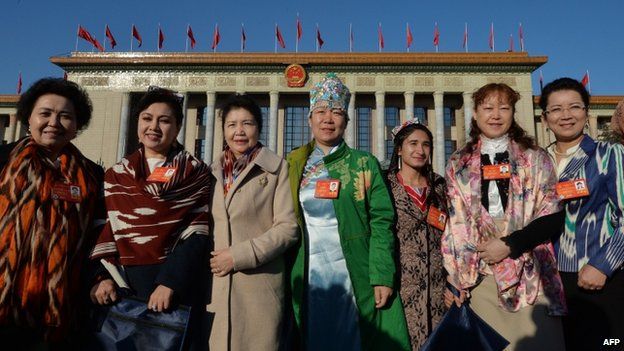
Xinjiang officially became part of Communist China in 1949
The region has had intermittent autonomy and occasional independence, but what is now known as Xinjiang came under Chinese rule in the 18th Century.
An East Turkestan state was briefly declared in 1949, but independence was short-lived - later that year Xinjiang officially became part of Communist China.
In the 1990s, open support for separatist groups increased after the collapse of the Soviet Union and the emergence of independent Muslim states in Central Asia.
However, Beijing suppressed demonstrations and activists went underground.
Profile: Xinjiang autonomous region
http://www.bbc.com/news/world-asia-pacific-16860974
What is at the heart of the unrest?
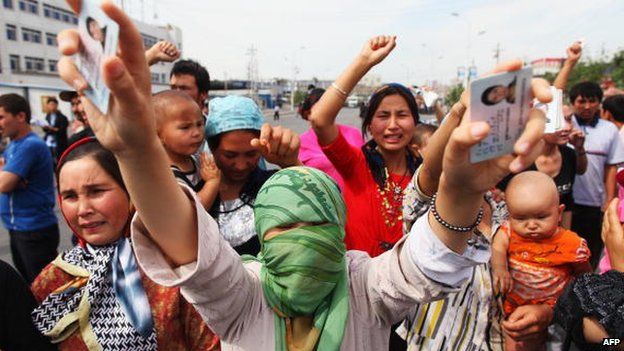
China's critics say authorities have stepped up a crackdown on Uighurs in recent years
While the situation is complex, many say that ethnic tensions caused by economic and cultural factors are the root cause of the recent violence..
Major development projects have brought prosperity to Xinjiang's big cities, attracting young and technically qualified Han Chinese from eastern provinces.
The Han Chinese are said to be given the best jobs and the majority do well economically, something that has fuelled resentment among Uighurs.
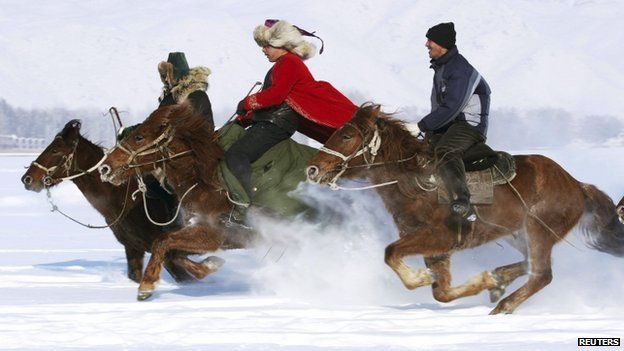
The Uighur culture leans more towards Central Asia than China
[ oh yeah, is that a supa picture or what!! ]
Activists say Uighur commercial and cultural activities have been gradually curtailed by the Chinese state. There are complaints of severe restrictions on Islam, with fewer mosques and strict control over religious schools.
Rights group Amnesty International, in a report published in 2013 .. http://www.amnesty.org/en/library/asset/POL10/001/2013/en/b093912e-8d30-4480-9ad1-acbb82be7f29/pol100012013en.pdf , said authorities criminalised "what they labelled 'illegal religious' and 'separatist' activities" and clamped down on "peaceful expressions of cultural identity".
In July 2014, some Xinjiang government departments banned Muslim civil servants from fasting .. http://www.bbc.com/news/world-asia-china-28123267 .. during the holy month of Ramadan. It was not the first time China had restricted fasting in Xinjiang, but it followed a slew of attacks on the public attributed to Uighur extremists, prompting concerns the ban would increase tensions.
Making sense of the unrest from China's Xinjiang
http://www.bbc.com/news/world-asia-china-26414016
Death on the Silk Route: Violence in Xinjiang
http://www.bbc.com/news/world-asia-pacific-14384605
How has the violence developed?
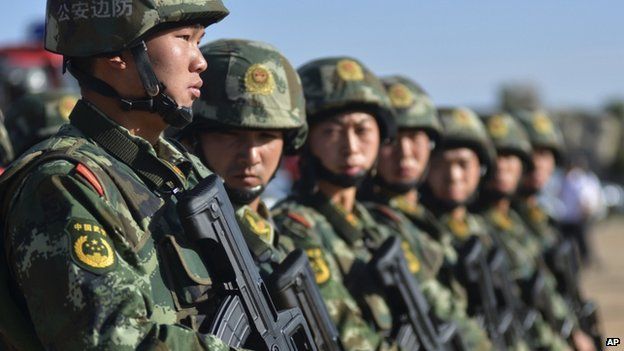
China has poured troops into the region in recent years as unrest has rumbled
China has been accused of intensifying its crackdown on the Uighurs after street protests in the 1990s and again in the run-up to the Beijing Olympics in 2008.
But things really escalated in 2009, with large-scale ethnic rioting in the regional capital, Urumqi. Some 200 people were killed in the unrest, most of them Han Chinese, according to officials.

Xinjiang's economy has largely revolved around agriculture and trade
Security was increased and many Uighurs detained as suspects. But violence rumbled on as right groups increasingly pointed to tight control by Beijing.
In June 2012, six Uighurs reportedly tried to hijack a plane from Hotan to Urumqi before they were overpowered by passengers and crew.
There was bloodshed in April 2013 and in June that year, 27 people died in Shanshan county after police opened fire on what state media described as a mob armed with knives attacking local government buildings
Establishing facts about these incidents is difficult, because foreign journalists' access to the region is tightly controlled, but in recent months, there appears to have been a shift towards larger-scale incidents where citizens have become the target, particularly in Xinjiang.
At least 31 people were killed and more than 90 suffered injuries in May 2014 when two cars crashed through an Urumqi market .. http://www.bbc.com/news/world-asia-china-27554067 .. and explosives were tossed into the crowd. China called it a "violent terrorist incident".
It followed a bomb and knife attack at Urumqi's south railway station in April, which killed three and injured 79 others.
In July, authorities said a knife-wielding gang attacked a police station .. http://www.bbc.com/news/world-asia-china-28558290 .. and government offices in Yarkant, leaving 96 dead. The imam of China's largest mosque, Jume Tahir .. http://www.bbc.com/news/world-asia-china-28586426 , was stabbed to death days later.
In September about 50 died in blasts in Luntai county outside police stations, a market and a shop. Details of both incidents are unclear and activists have contested some accounts of incidents in state media.
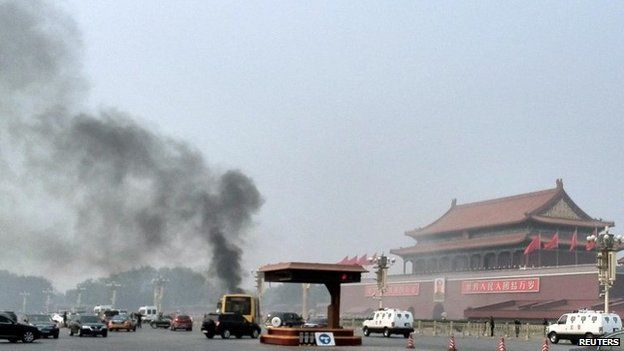
Chinese officials blamed the attack at Tiananmen Square on separatists from Xinjiang
Some violence has also spilled out of Xinjiang. A March stabbing spree in Kunming in Yunnan province that killed 29 people was blamed on Xinjiang separatists, as was an October 2013 incident where a car ploughed into a crowd and burst into flames in Beijing's Tiananmen Square .. http://www.bbc.com/news/world-asia-china-24768037 .
In response to the latest slew of attacks, the authorities have launched what they call a "year-long campaign against terrorism", stepping up security in Xinjiang and conducting more military drills in the region.
There have also been reports of mass sentencings .. http://www.bbc.com/news/world-asia-china-27600397 .. and arrests of several "terror groups". Chinese state media have reported long lists of people convicted of extremist activity .. http://www.bbc.com/news/world-asia-china-28258983 .. and in some cases, death sentences.
[ INSERT: Iranian Protesters Ransack Saudi Embassy After Execution of Shiite Cleric
http://investorshub.advfn.com/boards/read_msg.aspx?message_id=119595240 ]
High-profile Uighur academic, Ilham Tohti was detained and later charged in September 2014 on charges of separatism .. http://www.bbc.com/news/world-asia-29321701 ., sparking international criticism .. http://www.bbc.com/news/world-asia-china-29339178 .
Shock and anger after Kunming brutality
http://www.bbc.com/news/blogs-china-blog-26380542
China tries to block Xinjiang blast memorial
http://www.bbc.com/news/blogs-china-blog-27557027
Who's to blame?
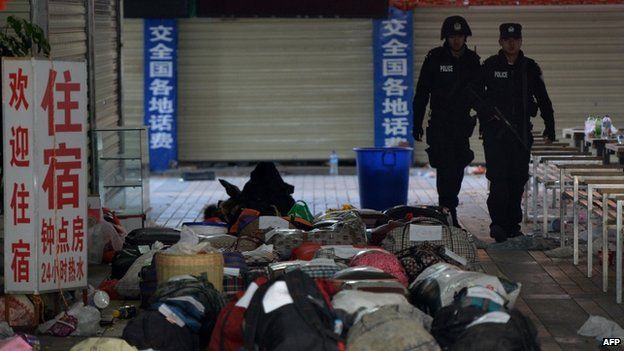
China also blamed Xinjiang separatists for the brutal attack in March 2014 at Kunming station
China has often blamed ETIM - the East Turkestan Islamic Movement - or people inspired by ETIM for violent incidents both in Xinjiang and beyond the region's borders.
ETIM is said to want to establish an independent East Turkestan in China. The US State Department in 2006 said ETIM is "the most militant of the ethnic Uighur separatist groups".
The scope of ETIM's activities remains unclear with some questioning the group's capacity to organise serious acts of extremism.
ETIM has not said it was behind any of the attacks. Chinese authorities said the Turkestan Islamic Party - which it says is synonymous with ETIM - released a video backing the Kunming attack, however.
With the recent apparent escalation in Xinjiang-related violence, the question of who and what is driving it is likely to attract greater scrutiny.
Q&A: East Turkestan Islamic Movement
http://www.bbc.com/news/world-asia-china-24757974
http://www.bbc.com/news/world-asia-china-26414014
See also:
World Reaction to Donald Trump’s Proposal Banning Muslims: Befuddlement and Despair .. bit ..
But Mr. Trump’s position also had its admirers. His stance on Muslim immigration drew several hundred favorable comments on China’s Twitter-like social media site, Weibo, where supporters linked his idea to their own fears of the Uighurs [ http://topics.nytimes.com/top/reference/timestopics/subjects/u/uighurs_chinese_ethnic_group/index.html ], a minority Muslim group in China’s northwestern region, some of whom have resorted to militancy and violence.
http://www.nytimes.com/2015/12/09/world/europe/donald-trumps-call-to-bar-muslims-reverberates-abroad.html
.. 2-3 inches from bottom here .. The GOP on the Eve of Destruction
http://investorshub.advfn.com/boards/read_msg.aspx?message_id=119029379
"Indonesia as a Model of Muslim Democracy
Developments, Problems, and Opportunities"
Wed Jan 6, 2016 4:34am EST
JAKARTA | By Randy Fabi and Agustinus Beo Da Costa
Saud Usman Nasution, the head of the National Counter-Terrorism Agency, gestures
during an interview at his office in Bogor, January 5, 2016.
Reuters/Beawiharta
Indonesian authorities are working with their counterparts in China to stem a flow of ethnic Uighur militants seeking to join Islamist jihadists in the world's most populous Muslim country, Indonesia's counter-terrorism chief said.
Saud Usman Nasution's comments come amid mounting concern in Indonesia about possible attacks by sympathizers of the Islamic State group and follows the arrest of 13 men across the island of Java, including a Muslim Uighur with a suicide-bomb vest.
The appearance among Indonesian militant networks of Uighurs, who come from the Xinjiang region in far-western China, is likely to add to Beijing's concerns that exiles will return to their homeland as experienced and trained jihadists.
China says Islamist militants and separatists operate in energy-rich Xinjiang on the borders of central Asia, where violence has killed hundreds in recent years.
Rights groups say much of the unrest can be traced back to frustration at controls over the Uighurs' culture and religion, and that most of those who leave are only fleeing repression not seeking to wage jihad. China denies repressing rights.
Nasution, who heads the National Counter-Terrorism Agency, told Reuters in an interview on Tuesday that several Uighurs had responded to a call last year by Santoso, Indonesia's most high-profile backer of Islamic State, to join his band of fighters.
Islamic State and human trafficking networks helped them travel via Myanmar, Thailand and Malaysia to Santoso's hideout in an equatorial jungle of eastern Indonesia, he said.
However, the would-be suicide bomber arrested on Dec. 23 was hiding in a house just outside the capital, Jakarta.
"We are cooperating with China and investigating evidence such as ATM cards and cellphones," Nasution said, adding that an Indonesian team went to China to interview members of the man's family, who would not confirm that they were related to him.
There was no immediate comment from China's foreign ministry on whether Beijing is collaborating with Indonesia.
"As far as China is concerned, these people are running off, some of them taking part in jihad and planning to strike back," said Pan Zhiping, a terrorism expert at the Xinjiang Academy of Social Sciences.
"Of course we must stop them. I believe, in terms of jointly guarding against extremism, it is necessary that we cooperate."
Bilveer Singh of the Rajaratnam School of International Studies in Singapore said the direct involvement of Chinese Uighurs in Southeast Asian militancy added "an external dimension to the existing home-grown terrorist threat".
"It could also complicate ties with a rising China, which may want to play a bigger counter-terrorism role in the region," Singh said in a Eurasia Review article.
'SERIOUS CONCERN FOR CHINA'
Indonesia's security forces have given Santoso, who styles himself as the commander of the Islamic State army in Indonesia, until Jan. 9 to surrender along with his force of about 40 men on the far-flung island of Sulawesi.
However, security analysts believe a larger threat is emerging across the populous island of Java as networks of support for Islamic State grow.
Indonesia has been largely successful in disrupting domestic militant cells since the bombing of two nightclubs on the resort island of Bali in 2002, and sporadic attacks have been mainly targeted at the police.
The government is now worried that the influence of Islamic State, whose fighters hold swathes of territory in Syria and Iraq, could bring a return of jihadi violence and strikes against foreigners and soft targets.
Officials believe there are more than 1,000 Islamic State supporters in Indonesia, and say that between 100 and 300 have returned from Syria, though this includes women and children.
Nasution said that monitoring of radical groups had revealed plans to launch attacks on Christmas Eve and around the New Year holiday but the situation was now under control.
"They cannot attack like in the Middle East or Europe because we anticipate before they attack. We monitor their activities every day," he said. "Their capability has not increased because their personnel is limited, their funding is limited and explosives are limited."
Police spokesman Suharsono said the Uighur arrested just outside Jakarta was part of an Islamic State-affiliated group based in the Central Java city of Solo.
Officials declined to comment on media reports that two other Uighurs from the same group were on the run, but they did confirm that three Uighurs were with Santoso.
Four others were sentenced last year to six years in prison for conspiring with Indonesian militants.
Todd Elliott, a Jakarta-based terrorism analyst for Concord Consulting, said many Uighurs will see Indonesia as more accessible than Turkey or Syria and are exploiting entrenched smuggling and human-trafficking networks to travel around the region undetected.
"I am sure returning Uighur fighters are a serious concern of the Chinese government," he said, adding that Islamic State's hardline ideology has gained traction among small minorities in both Xinjiang and Indonesia, binding them closer together.
(Additional reporting by Michael Martina in BEIJING; Writing by John Chalmers; Editing by Robert Birsel)
http://www.reuters.com/article/us-indonesia-security-idUSKBN0UK0SE20160106
==
Why is there tension between China and the Uighurs?
26 September 2014
The Xinjiang autonomous region in China's far west has had a long history of discord between
the authorities and the indigenous ethnic Uighur population. The BBC sets out why.
Who lives in Xinjiang?

The ethnic Uighur population used to be the majority in China's Xinjiang region
The largest of China's administrative regions, Xinjiang borders eight countries - Mongolia, Russia, Kazakhstan, Kyrgyzstan, Tajikistan, Afghanistan, Pakistan and India - and until recently its population was mostly Uighur.
Most Uighurs are Muslim and Islam is an important part of their life and identity. Their language is related to Turkish, and they regard themselves as culturally and ethnically close to Central Asian nations.
The region's economy has largely revolved around agriculture and trade, with towns such as Kashgar thriving as hubs along the famous Silk Road.
But development has brought new residents. In the 2000 census, Han Chinese made up 40% of the population, as well as large numbers of troops stationed in the region and unknown numbers of unregistered migrants.
Has Xinjiang always been part of China?

Xinjiang officially became part of Communist China in 1949
The region has had intermittent autonomy and occasional independence, but what is now known as Xinjiang came under Chinese rule in the 18th Century.
An East Turkestan state was briefly declared in 1949, but independence was short-lived - later that year Xinjiang officially became part of Communist China.
In the 1990s, open support for separatist groups increased after the collapse of the Soviet Union and the emergence of independent Muslim states in Central Asia.
However, Beijing suppressed demonstrations and activists went underground.
Profile: Xinjiang autonomous region
http://www.bbc.com/news/world-asia-pacific-16860974
What is at the heart of the unrest?

China's critics say authorities have stepped up a crackdown on Uighurs in recent years
While the situation is complex, many say that ethnic tensions caused by economic and cultural factors are the root cause of the recent violence..
Major development projects have brought prosperity to Xinjiang's big cities, attracting young and technically qualified Han Chinese from eastern provinces.
The Han Chinese are said to be given the best jobs and the majority do well economically, something that has fuelled resentment among Uighurs.

The Uighur culture leans more towards Central Asia than China
[ oh yeah, is that a supa picture or what!! ]
Activists say Uighur commercial and cultural activities have been gradually curtailed by the Chinese state. There are complaints of severe restrictions on Islam, with fewer mosques and strict control over religious schools.
Rights group Amnesty International, in a report published in 2013 .. http://www.amnesty.org/en/library/asset/POL10/001/2013/en/b093912e-8d30-4480-9ad1-acbb82be7f29/pol100012013en.pdf , said authorities criminalised "what they labelled 'illegal religious' and 'separatist' activities" and clamped down on "peaceful expressions of cultural identity".
In July 2014, some Xinjiang government departments banned Muslim civil servants from fasting .. http://www.bbc.com/news/world-asia-china-28123267 .. during the holy month of Ramadan. It was not the first time China had restricted fasting in Xinjiang, but it followed a slew of attacks on the public attributed to Uighur extremists, prompting concerns the ban would increase tensions.
Making sense of the unrest from China's Xinjiang
http://www.bbc.com/news/world-asia-china-26414016
Death on the Silk Route: Violence in Xinjiang
http://www.bbc.com/news/world-asia-pacific-14384605
How has the violence developed?

China has poured troops into the region in recent years as unrest has rumbled
China has been accused of intensifying its crackdown on the Uighurs after street protests in the 1990s and again in the run-up to the Beijing Olympics in 2008.
But things really escalated in 2009, with large-scale ethnic rioting in the regional capital, Urumqi. Some 200 people were killed in the unrest, most of them Han Chinese, according to officials.

Xinjiang's economy has largely revolved around agriculture and trade
Security was increased and many Uighurs detained as suspects. But violence rumbled on as right groups increasingly pointed to tight control by Beijing.
In June 2012, six Uighurs reportedly tried to hijack a plane from Hotan to Urumqi before they were overpowered by passengers and crew.
There was bloodshed in April 2013 and in June that year, 27 people died in Shanshan county after police opened fire on what state media described as a mob armed with knives attacking local government buildings
Establishing facts about these incidents is difficult, because foreign journalists' access to the region is tightly controlled, but in recent months, there appears to have been a shift towards larger-scale incidents where citizens have become the target, particularly in Xinjiang.
At least 31 people were killed and more than 90 suffered injuries in May 2014 when two cars crashed through an Urumqi market .. http://www.bbc.com/news/world-asia-china-27554067 .. and explosives were tossed into the crowd. China called it a "violent terrorist incident".
It followed a bomb and knife attack at Urumqi's south railway station in April, which killed three and injured 79 others.
In July, authorities said a knife-wielding gang attacked a police station .. http://www.bbc.com/news/world-asia-china-28558290 .. and government offices in Yarkant, leaving 96 dead. The imam of China's largest mosque, Jume Tahir .. http://www.bbc.com/news/world-asia-china-28586426 , was stabbed to death days later.
In September about 50 died in blasts in Luntai county outside police stations, a market and a shop. Details of both incidents are unclear and activists have contested some accounts of incidents in state media.

Chinese officials blamed the attack at Tiananmen Square on separatists from Xinjiang
Some violence has also spilled out of Xinjiang. A March stabbing spree in Kunming in Yunnan province that killed 29 people was blamed on Xinjiang separatists, as was an October 2013 incident where a car ploughed into a crowd and burst into flames in Beijing's Tiananmen Square .. http://www.bbc.com/news/world-asia-china-24768037 .
In response to the latest slew of attacks, the authorities have launched what they call a "year-long campaign against terrorism", stepping up security in Xinjiang and conducting more military drills in the region.
There have also been reports of mass sentencings .. http://www.bbc.com/news/world-asia-china-27600397 .. and arrests of several "terror groups". Chinese state media have reported long lists of people convicted of extremist activity .. http://www.bbc.com/news/world-asia-china-28258983 .. and in some cases, death sentences.
[ INSERT: Iranian Protesters Ransack Saudi Embassy After Execution of Shiite Cleric
http://investorshub.advfn.com/boards/read_msg.aspx?message_id=119595240 ]
High-profile Uighur academic, Ilham Tohti was detained and later charged in September 2014 on charges of separatism .. http://www.bbc.com/news/world-asia-29321701 ., sparking international criticism .. http://www.bbc.com/news/world-asia-china-29339178 .
Shock and anger after Kunming brutality
http://www.bbc.com/news/blogs-china-blog-26380542
China tries to block Xinjiang blast memorial
http://www.bbc.com/news/blogs-china-blog-27557027
Who's to blame?

China also blamed Xinjiang separatists for the brutal attack in March 2014 at Kunming station
China has often blamed ETIM - the East Turkestan Islamic Movement - or people inspired by ETIM for violent incidents both in Xinjiang and beyond the region's borders.
ETIM is said to want to establish an independent East Turkestan in China. The US State Department in 2006 said ETIM is "the most militant of the ethnic Uighur separatist groups".
The scope of ETIM's activities remains unclear with some questioning the group's capacity to organise serious acts of extremism.
ETIM has not said it was behind any of the attacks. Chinese authorities said the Turkestan Islamic Party - which it says is synonymous with ETIM - released a video backing the Kunming attack, however.
With the recent apparent escalation in Xinjiang-related violence, the question of who and what is driving it is likely to attract greater scrutiny.
Q&A: East Turkestan Islamic Movement
http://www.bbc.com/news/world-asia-china-24757974
http://www.bbc.com/news/world-asia-china-26414014
See also:
World Reaction to Donald Trump’s Proposal Banning Muslims: Befuddlement and Despair .. bit ..
But Mr. Trump’s position also had its admirers. His stance on Muslim immigration drew several hundred favorable comments on China’s Twitter-like social media site, Weibo, where supporters linked his idea to their own fears of the Uighurs [ http://topics.nytimes.com/top/reference/timestopics/subjects/u/uighurs_chinese_ethnic_group/index.html ], a minority Muslim group in China’s northwestern region, some of whom have resorted to militancy and violence.
http://www.nytimes.com/2015/12/09/world/europe/donald-trumps-call-to-bar-muslims-reverberates-abroad.html
.. 2-3 inches from bottom here .. The GOP on the Eve of Destruction
http://investorshub.advfn.com/boards/read_msg.aspx?message_id=119029379
It was Plato who said, “He, O men, is the wisest, who like Socrates, knows that his wisdom is in truth worth nothing”
Join the InvestorsHub Community
Register for free to join our community of investors and share your ideas. You will also get access to streaming quotes, interactive charts, trades, portfolio, live options flow and more tools.










